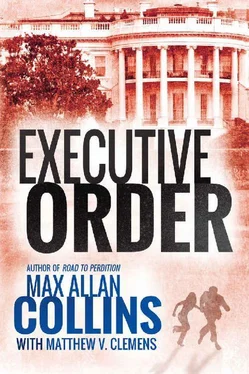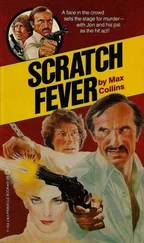But Reeder withdrew the baton, extended it with a snap, and whapped the guy across the left calf, getting a yelp out of him and sending him face-first onto the sidewalk with a thump.
Reeder rushed the attacker, who flipped onto his back and sent another kick at Reeder, who dodged it — the attacker’s face remaining a smudge in the night, thanks to darkness and movement. A second kick got Reeder in the right forearm and his fingers popped open and the baton jumped out, landing God knew where. Both men scrambled to their feet and Reeder reached behind him for the pistol in his waistband, but the attacker sent out another kick to Reeder’s ribs, doubling him over.
By the time Reeder regained his breath, the man was sprinting away, likely heading back to the Explorer. Reeder gave chase, but his opponent had too big a head start, and Reeder’s ribs were screaming. Reeder caught up only as the Explorer lurched away from the curb and sped off.
A glimpse of the attacker’s face, in the side rearview mirror, didn’t really help much. The license plate had been removed — no help there either.
He caught his breath, rubbed his aching ribs, then looked up and down the block. Not a single porch light had come on, the struggle apparently unnoticed. He went back to the scene of the attack, to retrieve the extending baton. He found it quickly, just down the sidewalk. But he also spotted something else, something small, making a reflective glimmer off a streetlight.
It was a lapel pin of a US flag, a common enough touch on men’s lapels in this town — only this one had a tiny camera. The little high-tech thing had been smashed in the struggle.
But Reeder knew what the lapel-flag camera was. And he knew of only one group of people who wore such a pin.
Agents of the United States Secret Service.
“The most terrifying words in the English language are: I’m from the government and I’m here to help.”
Ronald Reagan, fortieth President of the United States of America. Served 1981–1989. Formerly the thirty-third governor of California following a successful screen-acting career.
Rogers said, “The pin could belong to someone who wants you to believe they’re with the Secret Service.”
Reeder, seated next to her, gave Rogers a blank look that somehow conveyed his contempt for that notion.
They were in the outer office of the Director of the United States Secret Service on the ninth floor of its H Street HQ. According to Reeder, he and Jonathon Briar, the first African American to hold the directorship, had been field agents around the same time.
That didn’t seem to be helping as half an hour of waiting turned into an hour. Of course, Reeder hadn’t left the Secret Service under the best of circumstances.
“I’m just saying,” she said, “that some unknown Secret Service agent jumping you isn’t the only possible explanation.”
“You saw the ID number on the back. He might as well have signed it Secret Service.”
Rogers took air in, let it out, then rose and went to the desk, where a brunette guardian of the gates was giving her computer the attention they weren’t getting, and said, “Excuse me?”
The woman looked up, narrow-faced if attractive with scant makeup, her dark gray suit and midnight blouse nice enough for Rogers to wonder how much better the SS must pay than the FBI. The guardian’s eyes, a lighter gray than her apparel, met Rogers’ without a word. That was apparently all the response an FBI agent merited.
“We had an appointment,” Rogers said. “It’s been over an hour.”
“The appointment was made only this morning.”
“You do know who Mr. Reeder is?”
The guardian nodded, about as impressed as a maître d’ at a really expensive restaurant. “Yes, and I told Mr. Reeder earlier, on the phone, that I would do my best to squeeze him in.”
“There’s no one else out here.”
“The Director is in conference.”
Getting that principal’s office feeling again, Rogers nodded and dragged back to her seat.
Five more minutes passed and the Director’s office door opened and a tall male figure emerged — that same GAO drone in wire-frames and a Men’s Wearhouse suit who she’d seen at Fisk’s office. This time Rogers didn’t rate the stranger’s nod of admission that she was a human being. Even the famous Joe Reeder got ignored.
Rogers whispered, “Conference must be over. We have to be next.”
Reeder didn’t give her a nod, either.
But fifteen minutes later he got up and strode to the Director’s door.
The assistant said, “Mr. Reeder — you can’t simply—”
But he did, with Rogers following right after, pausing only to give the guardian a condescending smile before shutting herself and Reeder inside.
Fiftyish Director Jonathon Briar, broad-faced on a muscular mid-range frame, his navy suit with red-and-white tie blatantly patriotic, actually started a bit when they came in. To the right as they entered, Briar was seated behind a black slab that was more table than desk, two modern beige visitor’s chairs opposite, a looming framed portrait of President Harrison on the wall behind him. The large, stark office seemed to be keeping as many secrets as the Service itself. To the left was a meeting area with a low-slung black slab table and various modern but comfortable-looking chairs.
“Jesus, Peep,” Briar blustered. “You know better than this!”
Reeder stood at the edge of the desk-thing and stared down at Director Briar.
“You’re right, Jon,” Reeder said. “I should have barged in here the moment your last guest left. I’m getting complacent.”
Reeder was standing between the two visitor’s chairs and Rogers was just behind the one to Reeder’s left. Briar’s eyes met hers and narrowed.
Rogers held up her credentials, but Briar said, “I know who you are, Agent Rogers. Do you mind, Peep, telling me what this is about? Make it quick — I have another meeting in ten minutes.”
“Let them wait an hour,” Reeder said, and tossed a small plastic evidence bag with the smashed pin in it onto Briar’s desk. Briar was wearing his own, somewhat smaller lapel flag pin — did it come equipped with a camera, too?
Then Reeder lowered himself into one of the visitor’s chairs and waved Rogers into the other.
Briar stared at the smashed pin in the bag. “Where did you get that?”
“It fell off someone who attacked me last night, not far from my home. I can show you the bruises on my ribs if you’re interested. You’ll note that that’s an American flag camera pin, a mangled one I grant you.”
“Homeland uses these,” Briar said, with a shrug. “Agent Rogers will tell you they’re not unknown to the Bureau, as well, and several other agencies.”
Reeder reached over and flipped the evidence bag. “Do I have to remind you, Jon, that the SS is the only one who uses that form of ID number?”
“That’s not one of ours,” Briar said without looking at it.
“It’s one of yours, all right. And I want to know who this one belongs to.”
Briar smirked mirthlessly. “Has procedure changed, Peep, since you worked here? You know damn well that if an agent loses one of these, he or she is required to report it immediately. No one has.”
“Why, do you check the reports yourself?”
“Actually, yes. Every day. Are we done here?”
Rogers asked, “Director Briar, who was it that left this office before we came in? In the wire-framed glasses?”
The Director said, “He’s with the GAO. Nothing that concerns you.”
“Would he have a name, sir?”
Briar said, “That’s not information I’m prepared to share with you, Agent Rogers. You seem to have the Secret Service confused with the Smithsonian.”
Читать дальше












